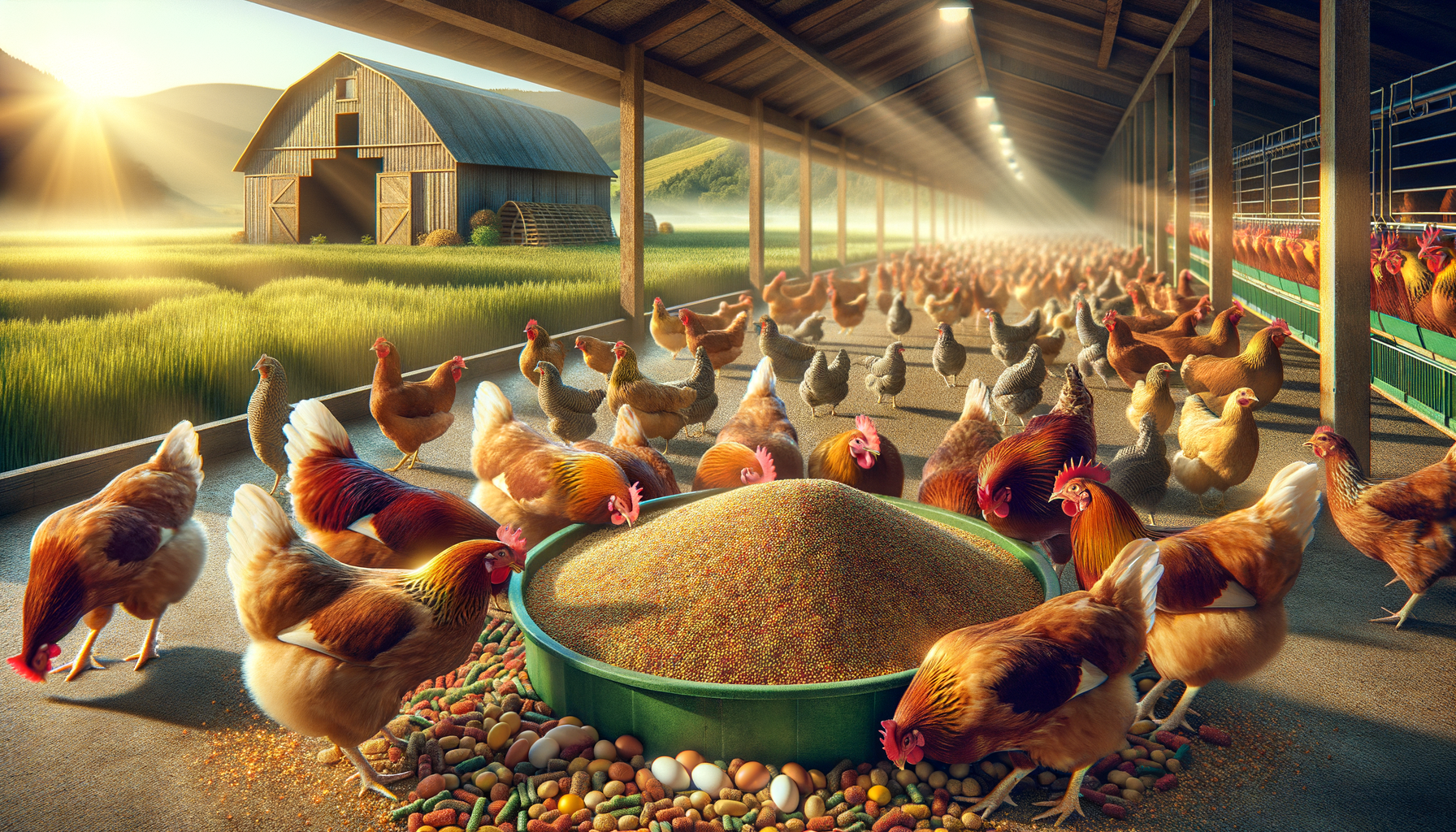
Discover bulk feed options, nutritional tips, and more to keep your chickens healthy.
Understanding Poultry Nutrition
Feeding poultry is not just about filling feeders with grains; it’s about providing a balanced diet that meets their nutritional needs. Chickens, like all animals, require a mix of proteins, carbohydrates, fats, vitamins, and minerals to thrive. The importance of proper nutrition cannot be overstated, as it directly affects their growth, egg production, and overall health.
Proteins are essential for growth and egg production. Young chicks need a higher protein diet to support rapid growth, while laying hens require adequate protein to produce eggs consistently. Carbohydrates provide the energy needed for daily activities, and fats are necessary for absorbing fat-soluble vitamins and providing essential fatty acids.
Vitamins and minerals play a crucial role in maintaining health and preventing diseases. For instance, calcium is vital for eggshell formation, and a deficiency can lead to weak eggshells and poor laying performance. Additionally, vitamins like A, D, and E are important for immune function and overall vitality.
By understanding the nutritional requirements of poultry, farmers can tailor their feeding strategies to ensure optimal health and productivity. This knowledge is the foundation for selecting the right feed types and managing diets effectively.
Types of Poultry Feeds
Poultry feeds come in various forms, each designed to meet specific dietary needs. The most common types include starter, grower, and layer feeds, each formulated for different stages of a chicken’s life.
Starter feeds are high in protein, typically around 20-24%, to support the rapid growth of chicks. These feeds are finely milled to make it easy for young birds to consume and digest. Grower feeds, on the other hand, are used for adolescent birds and have slightly lower protein levels, around 16-18%. They are designed to support steady growth without the risk of obesity.
Layer feeds are formulated for hens that are actively laying eggs. These feeds are rich in calcium and have a balanced protein content of about 16-18%. The added calcium is crucial for strong eggshells and overall reproductive health.
In addition to these basic types, there are specialty feeds available for specific purposes, such as organic feeds, medicated feeds for disease prevention, and feeds enriched with omega-3 fatty acids to enhance the nutritional quality of eggs. Choosing the right feed type depends on the specific needs and goals of the poultry operation.
Bulk Feed Options and Storage Tips
For poultry farmers, purchasing feed in bulk can be a cost-effective strategy. Bulk feed options often come at a reduced price per unit, allowing farmers to save money while ensuring a steady supply of nutrition for their flock. However, buying in bulk also requires careful storage to maintain feed quality.
Proper storage is crucial to prevent spoilage and contamination. Feed should be stored in a cool, dry place away from direct sunlight and moisture. Using airtight containers or bins can help protect the feed from pests and environmental factors. Additionally, it’s important to rotate stock regularly, using older feed first to ensure freshness.
Some farmers opt for custom-mixed bulk feeds tailored to their specific needs. This approach allows for greater control over the nutritional content and can be particularly beneficial for operations with unique dietary requirements. However, it requires a thorough understanding of poultry nutrition to ensure balanced formulations.
Overall, bulk feed options provide an economical and efficient way to manage poultry nutrition, but they require careful planning and management to maximize their benefits.
Supplementing Poultry Diets
While commercial feeds are formulated to meet the basic nutritional needs of poultry, supplements can play a valuable role in enhancing diet quality. Common supplements include grit, oyster shell, and various vitamins and minerals.
Grit is essential for birds that consume whole grains or have access to free-range foraging. It aids in the digestion of fibrous materials by grinding them down in the gizzard. Oyster shell is another important supplement, particularly for laying hens, as it provides additional calcium to support strong eggshells.
Vitamins and mineral supplements can be beneficial during periods of stress, such as molting, extreme weather, or illness. These supplements help boost the immune system and support overall health. However, it’s important to use them judiciously, as excessive supplementation can lead to imbalances and health issues.
By carefully integrating supplements into the diet, poultry farmers can address specific nutritional gaps and optimize the health and productivity of their flock.
Monitoring and Adjusting Poultry Diets
Regular monitoring and adjustment of poultry diets are crucial for maintaining optimal health and productivity. Observing the flock’s behavior, growth rates, and egg production can provide valuable insights into the effectiveness of the current diet.
Signs of nutritional deficiencies include poor growth, feather loss, reduced egg production, and abnormal egg quality. If such issues arise, it may be necessary to adjust the feed formulation or supplementation strategy. Consulting with a poultry nutritionist can help identify specific deficiencies and recommend appropriate solutions.
In addition to addressing deficiencies, it’s important to consider seasonal changes and their impact on dietary needs. For instance, during colder months, birds may require additional energy to maintain body temperature, while hot weather might necessitate adjustments to prevent heat stress.
By staying attuned to the needs of the flock and making informed dietary adjustments, poultry farmers can ensure their birds remain healthy and productive throughout the year.


